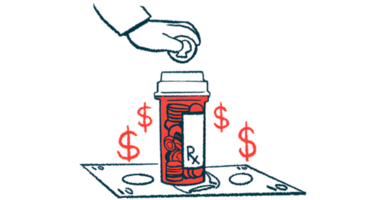Study Ties Swallowing Abilities to Disease Progression

Swallowing difficulties seem to be associated with progression of Parkinson’s disease, a study has found.
Researchers found that high doses of levodopa can increase xerostomia — or dry mouth — and negatively affect the oral environment. Moreover, people with Parkinson’s seem to be unaware of their swallowing difficulties, which could lead to poor oral health.
The study, “Impact of Progression of Parkinson’s Disease on Swallowing Ability and Oral Environment,” was published in Parkinson’s Disease.
As Parkinson’s disease progresses, patients often experience swallowing difficulties — dysphagia. Consequently, food and liquid consistency need to be adjusted and monitoring oral health is very important.
The most common methods to evaluate dysphagia include videofluoroscopy — an examination used to look at swallowing capacity using x-ray video — and endoscopy, which consists of observing the throat with an endoscope. However, these tests are typically not available to primary care clinicians and can be expensive.
Using simple non-invasive screening measurements, a team of researchers from Japan investigated the impact of disease severity and treatment on swallowing function and oral environment.
A total of 87 patients with Parkinson’s were recruited (mean age 72 years). Participants’ regular diet type was classified into three of seven levels based on the Functional Oral Intake Scale (FOIS), with patients belonging to three categories of this scale: level zero (tube dependent); level six (total oral intake with no special preparation, but must avoid specific foods or liquid items); and level seven (total oral intake with no restrictions).
For each patient, the team performed a series of evaluations, which included the unified Parkinson’s disease rating scale (UPDRS) part III to measure motor symptoms, a self-reported questionnaire of swallowing disturbances (SDQ), and the oral bacterial count (OBC).
Based on the SDQ questionnaire, participants were divided into two groups, a non-dysphagic group (a score lower than 11 points), and a dysphagic group (scoring 11 or higher). Although 29.5% of patients had an SDQ score of more than 11 points, meaning they were dysphagic, almost all were still on a normal diet, indicating that participants had low self-awareness of dysphagia.
Researchers also found that the number of bacteria inside the mouth was significantly higher in the dysphagic group.
“[W]e found a significant negative correlation between SDQ score and OBC [oral bacterial count] in the 87 participants, suggesting that dysphagia progression may reduce the number of oral bacteria in patients with [Parkinson’s disease] despite their limited ability to maintain oral hygiene by themselves,” the researchers wrote.
However, no association was found between oral bacterial counts and disease duration or UPDRS part III score.
The results, however, indicated a relationship between SDQ scores and motor function, as well as disease duration. “We found a significant positive correlation between the UPDRS part III score and SDQ score, indicating that disease progression is associated with more severe swallowing difficulties, corroborating the results of previous studies,” the researchers wrote.
Next, the usual medications for Parkinson’s were checked for 56 of the 87 participants in the study. Oral bacterial counts showed a negative correlation with the levodopa equivalent daily dose (LEDD), which according to researchers suggested that dry mouth, a possible medication side effect, may have restricted the growth of bacteria.
“These results indicate low self-awareness of dysphagia among patients with PD and highlight the importance of careful diet-type monitoring and adjustment to prevent aspiration. Moreover, patients and clinicians should be alert for deterioration in oral health with swallowing dysfunction and be aware that higher dopaminergic medication dose (LEDD) may impair the oral environment by inducing xerostomia,” the researchers wrote.
A few study limitations were pointed out by the researchers. Swallowing difficulties were evaluated using a self-reported test and simple physical measurements. These may not be as precise as more invasive methods. In addition, many patients were on other medications besides those for Parkinson’s, which also could contribute to dry mouth.






